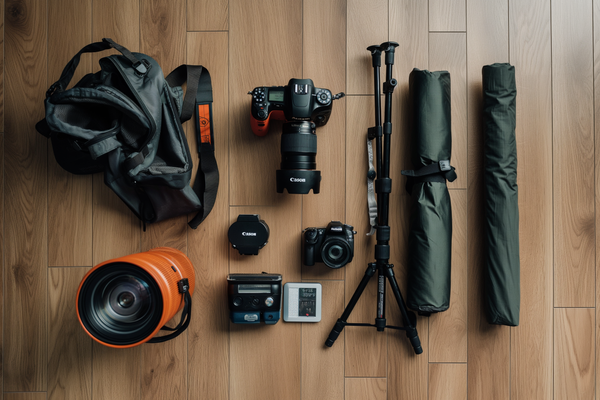The Hidden Costs of Selling: Why Renting Your Stuff Makes More Sense in 2025

There’s a kind of satisfaction in clearing out the clutter, posting that old DSLR or power drill to eBay or Facebook Marketplace, watching it disappear in a few days with a small cash reward. One less thing taking up space, a bit more in your Monzo balance.
But lately, that approach feels... dated.
We’re moving into a decade shaped by new models of ownership, or rather, non-ownership. The way we think about stuff is evolving. As more people in Oxford and cities across the UK lean into sustainable practices and tech-enabled convenience, the idea of selling things outright is starting to look like a short-term play in a long-term economy.
Enter Lental - a UK-based peer-to-peer rental marketplace helping people in places like Oxford and London turn everyday items into income, without letting go of them. In a time where passive income and sustainability intersect, renting out your stuff isn’t just smarter, it’s the future.
Selling Is a One-Time Transaction. Renting Is a Revenue Stream.
Let’s say you’ve got a cordless drill. Maybe you used it once to put up shelves, and now it’s sat untouched in a storage box under the stairs. You could sell it for £40 on Facebook Marketplace and that’s it, job done. But you’ve traded a reusable asset for a one-off sum.
Now, imagine instead you rent that drill out for £5 a day. It gets booked eight times a month by people across Oxford who are doing DIY, assembling flatpacks, or tackling garden projects. That’s £40 a month, the same as the sale price, but now imagine that continuing for 6 or 12 months. You’ve now earned £240–£480 from something you’d have already parted with.
Same item. Entirely different mindset.
And that’s just a drill. People are renting out projectors, camping gear, suitcases, camera lenses, tents, garden tools, even sewing machines. It’s a new kind of passive income that doesn’t rely on having a property portfolio or a van full of equipment, just items you already own.
The Hidden Losses of Selling Stuff You Might Need Again
There’s also a hidden cost we rarely talk about when selling: having to re-buy the same thing later.
How many times have you sold something to “free up space” and then months later found yourself in a situation where you needed it again? Maybe you sold your camping gear during a move, then got invited on a festival weekend in Cornwall. Or got rid of a GoPro, only to start planning that surf trip to Portugal.
We often think selling is a clean break, but in reality, it’s a bit like cutting off a branch only to graft it back on later.
Renting keeps the door open. You retain ownership, but you’re still getting value from the item in the meantime. And if you do need it again, it’s still yours, not sitting in someone else’s loft.
Selling Online Isn’t as Easy as It Seems
Sure, selling is quick, but it’s rarely frictionless. Anyone who’s listed something on Depop, Vinted or eBay knows the routine:
- Lowball offers
- No-shows
- Postage headaches
- Platform fees
- Ghosting after you’ve reserved an item
It’s not just time-consuming; it’s mentally draining. You’re managing expectations, chasing payments, and dealing with strangers who often treat you like a retailer, without any of the guarantees.
Rental platforms like Lental are increasingly building smarter systems, QR check-ins, deposit management, ID verification, and location-based matching, to streamline and de-risk the process. And because the rental period ends, there’s a built-in return mechanism. It’s less of a goodbye, more of a lend.
A Culture Shift: From Possession to Access
The idea of owning less isn’t radical anymore. For a generation raised on Spotify, Netflix, and Uber, access has quietly overtaken ownership as the status symbol.
We’re not as interested in having stuff. We’re interested in using it, experiencing it, and sharing it. This is especially true in university cities like Oxford, where space is limited, costs are high, and there's a strong undercurrent of progressive values and sustainability consciousness.
Renting instead of selling aligns with that ethos; less waste, less consumption, more shared utility. It’s not about being anti-capitalist. It’s about being smarter with the stuff we already have.
The Environmental Logic: Circular Economy in Action
Every time you sell an item and someone else buys it, great - you’ve extended its life. But when you rent, that same item may go through 50 users before it wears out. That’s circular economy 2.0.
The CO₂ emissions per user go down. Fewer new goods need to be produced. And individuals who can’t afford to buy a £300 camera can still access one for a weekend project, creating inclusion and accessibility without mass production.
In a world where sustainability is no longer optional, this kind of micro-sharing is a practical, daily act of climate-conscious living.
An Oxford Case Study: The Projector That Paid For Itself 5x
Sam, a software developer living in Jericho, bought a mini projector during lockdown. Once cinemas reopened, it sat unused for months. On a whim, he listed it on a local rental platform.
Within a few weeks, bookings started trickling in: student movie nights, garden parties, birthday slideshows. Over a year, Sam made over £300 from that projector — more than five times what he paid for it. And he still has the projector.
Why This Works Now (and Didn’t Before)
The idea of renting out your belongings isn’t new. It’s been tried before, but it never really stuck. So why is it finally working now?
Because the world has changed, and the timing is right.
- It’s finally easy to do – In the past, renting something out meant back-and-forth messages, awkward meet-ups, and chasing people for payment. Now, platforms like Lental handle listings, bookings, messaging, and payments in one place. It takes minutes, not days.
- People feel safer – A decade ago, lending to strangers felt risky. But trust tools like ID checks, QR handovers, and optional deposit systems make it feel more like lending to a neighbour than a random online stranger. It’s structured. It’s trackable.
- We think differently about ownership – More people, especially in cities like Oxford, are moving away from clutter and towards access. Why own something you rarely use when you can rent it? And why sell something valuable when it could earn you income over and over?
- Extra income matters more than ever – With rising rent, bills, and day-to-day costs, people are actively looking for smart ways to make a bit more each month. Renting out the things you already own is one of the lowest-effort ways to do it.
- It’s aligned with our values – Renting out your stuff isn’t just smart financially, it supports the circular economy. It means less waste, fewer new products being made, and more shared use of what already exists.
Ten years ago, peer-to-peer rental felt like a nice idea. Today, it feels obvious. The tools are in place, the risks are lower, and the mindset has shifted. What didn’t work in 2015 works now, because both the world and the way we live in it have moved on.
Where Lental Fits In
Lental is a UK-built, purpose-driven rental marketplace designed for exactly this kind of exchange. Focused on cities like Oxford, Bristol, and London, it’s geared towards everyday items and local handovers, not just niche equipment.
Unlike some marketplaces that slap you with 25% fees, Lental is structured to maximise what lenders earn, while building trust and simplicity into every transaction. It’s still early, but that’s the point. Early movers often see the greatest upside.
🟢 Join the community – Sign up to Lental and start earning from the items you already own.
Final Thought: Rent the Future - Don’t Sell Yourself Short
Selling something feels clean. Done. But more often than not, it’s a quiet loss, not just of the item, but of its future value. We’ve been taught that owning less is a virtue. But in the world we’re moving into, owning smart is what really matters.
If you’ve got useful stuff just sitting there - tools, tech, gear - don’t be so quick to get rid of it. Renting it out means you’re not just clearing space, you’re creating value. You keep the item, and let it earn for you, again and again.
It’s not about hustle. It’s about not wasting what you already have. In 2025, financial sustainability and environmental sustainability aren’t opposites, they’re part of the same mindset.
So don’t let your stuff sit there doing nothing. Let it circulate. Let it work.
Because the future isn’t just shared, it’s smart.





